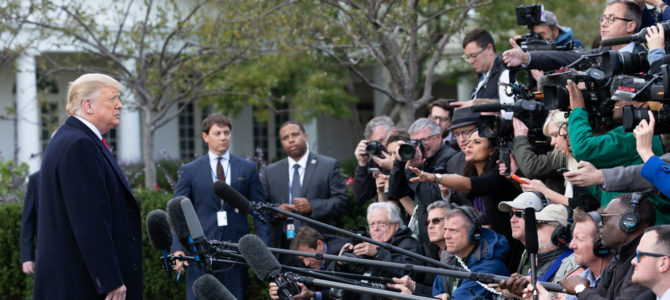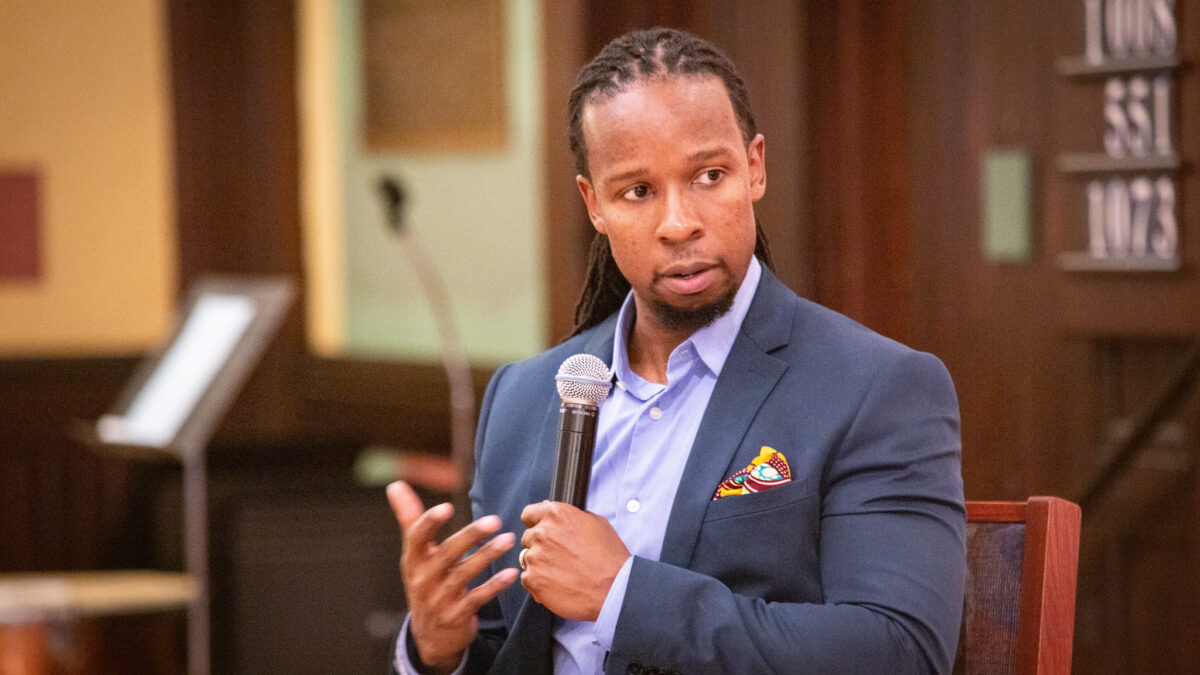For Washington staffers and politicos, a day off on Monday creeps into a half-day on Friday (“to beat the traffic”), which seeps into an early Thursday (“packing for the trip”). Among this sizable set of folks stretching from the Hill to its consultants to their non-profits, Labor Day is half-sacred. The lazy, end-of-summer weekend away took a broadside Thursday night, however, when The Atlantic’s Jeffrey Goldberg published a badly sourced, difficult-to-confirm, belief-stretching story about President Donald Trump denigrating America’s honored dead at Belleau Woods, France.
The political motivation of the accusations was laid bare by early Friday morning when MSNBC debuted a political attack ad based on the piece that was prepared in a deeply suspicious record time. The trap was set — and poor adherence to journalistic practices made it all possible.
Throughout the long weekend, skeptical journalists cast serious doubts on the Goldberg’s standards and methods, and on what passes today as “confirmation,” but for those outside the media industry it’s a he-said-she-said with potentially serious political consequences for the president. So what exactly did The Atlantic and its legions of friends do wrong here and why can’t we believe this reporting on its face? The answer could fill a semester of basic journalism school, but boiled down: poor sourcing practices, confirmation bias, and an echo chamber’s misleading “confirmations” dominated the cycle.
Sourcing
Anonymity is like crack in politics, and especially since President Trump has been elected, everyone is addicted. Anonymity was once a rare thing, given only when convincing evidence of serious risk to the source was presented alongside a story important enough to make the trade worthwhile. Even then, reporters (or at least their editors) felt rightly compelled to justify why they made the call to demand suspicious readers trust their by-nature secret vetting process.
Over the past few years, reporters and editors have increasingly abandoned these rules in a greedy rush to capitalize on the sieve-like culture of Trump’s early White House and Democrats’ investigatory committees, scoring points against their new nemesis and getting clicks along the way. More and more often, no reason is even given for the anonymity, and sources treat newspapers as dumping grounds for cowardly and ungrounded political hits they’re not held accountable for. The reporters and editors, equally addicted to the attention that breaking news brings, allow it.
Today, senior staffers demand anonymity for comments as benign and boring as complimenting their boss, and reporters who say “no” or even just publicly detail their reason for concealing a source’s name can often expect an angry phone call. In one I recall, an exasperated communications staffer who is normally soft-spoken heatedly demanded a reason for my refusal to cite an anonymous administration official without an explanation when “CNN and Newsweek had no issue with it.”
Anonymity is not simply used by sources, but unscrupulous reporters who blend who is who to cover for the rumors, gossip, and innuendo they pass as journalism these days. Phrases like “according to former and current officials,” for example, sound important but the reality of many of the actually important jobs in government is former employees don’t know what is happening one week after they’ve left the building. For some reporters, using phrasing to blend a host of “formers” in with maybe one current employee creates the illusion of exhaustive reporting and trustworthy sourcing.
Anonymity is most dangerous when it’s used to make attacks. Washington is filled with “senior officials,” and the White House alone has dozens. If those sources are not in the room, did not see or hear the thing said, or can’t provide documents, emails, or other evidence to back their claims, good reporters can’t report them.
Feeling so close to something you cannot nail down is deeply frustrating, but the good reporters and editors should be satisfied knowing they at least have a lead to pursue until it can be proven or disproven. It’s as simple as that. In the case of Goldberg’s Atlantic story, notice none of those cited are primary sources. Most college professors wouldn’t accept secondary sourcing for a term paper, but somehow the editor in chief of The Atlantic held himself to this standard.
Even more egregiously in the case of Goldberg’s story is that substantial primary sources existed, including both people and documents. They are contradicting the secondary-source rumor-mongering that was the entire lead of the piece. That should have earned a swift no-publish call, but instead their qualms went completely unmentioned.
I would be much more inclined to believe Goldberg’s piece if he’d included the FOIA docs or the Bolton account of the trip in his lede or bridge. He didn’t. He’s the EIC of the Atlantic. Excluding that info was probably not a mistake.
— Geoffrey Ingersoll (@GPIngersoll) September 7, 2020
It shows he was probably only concerned w telling what he thought was a truth, versus the whole truth.
— Geoffrey Ingersoll (@GPIngersoll) September 7, 2020
I just watched Goldberg's interview on CNN and was struck by his response to evidence that the flight to the cemetery was canceled for weather. Both Bolton and Pentagon sources have confirmed that reason, and Goldberg says that that all may be true… https://t.co/CaKg1rVyTJ
— Jonathan Turley (@JonathanTurley) September 6, 2020
To be aware of this massive hole, as Goldberg clearly is, but run the story anyways points to a host of other problems that stretch across the industry, among them confirmation bias, or the inclination to believe things that fit into and confirm your worldview.
Confirmation Bias
Confirmation bias is true across most human interactions, but in journalism, it has reached comedic levels. At The Atlantic just a month ago, The Federalist exposed and outed a story that begins with a police officer going unpunished for shooting a black child for skipping a basketball sign-in sheet at a community rec center.
It was the kind of story you might not wonder deeply about if you feel that police officers are actively hunting black children and going unpunished for it, but for those who don’t believe that is the case, the story was suspicious. As it turned out, the story was suspicious because it was false. The Atlantic would have saved itself embarrassment had its editors, who are more inclined to believe things like this, so much as asked for a newspaper clip to confirm the story.
The age of Donald Trump has put this on steroids, leaving once-careful publications eager to believe, print, and reprint stories about the Ku Klux Klan depressing the black vote by distributing joints at polling centers, or the gross idea that there’s a Russian “pee-tape” of the famously germaphobic president. Or that President Trump, who while in France stood in the rain to honor American war dead, would cancel a day to honor American war dead because they are “losers” and the rain would hurt his hair.
Reporters have to be very careful of stereotypes. While all people use them in some capacity to understand the world, they intrinsically lead to a dumb caricature of reality when pushed toward their limits. Trump insults the service of Sen. John McCain and attacks the father of a dead American soldier, both of whom he had public, living, back-and-forth feuds with, so why would he not attack men who died long before he was born, and whom he had traveled to France in part to honor?
Or, “Trump denigrated McCain’s service, therefore he will denigrate the service of those who died in World War I.” If you wholeheartedly believe the caricature of a belligerent, hateful, anti-military man it makes sense, but if you study the person it doesn’t compute.
“Trump’s understanding of concepts such as patriotism, service, and sacrifice,” Goldberg writes, “has interested me since he expressed contempt for the war record of the late Senator John McCain, who spent more than five years as a prisoner of the North Vietnamese.”
This kind of confirmation bias leads to a quickness to believe, which can lead to not asking the right questions — a fatal mistake for good reporting. “Are there people in the room who could verify this? Have they already gone on the record on this situation?”
Within hours of the story’s evening release, a campaign ad was apparently produced, filmed, and pitched. By mid-day Friday, multiple news outlets had managed to “find” the multiple anonymous sources Goldberg used and “confirm” the story. This strongly, strongly suggests a coordinated political hit, and makes other important questions that were skipped even more salient.
Questions like “Why in September 2020, two years after this allegedly happened, are we first hearing it?” Or, “Why, when Gen. John Kelly and John Bolton are on-the-record critics of the president, did they not share this? The latter wrote a book on hating the president.” Kelly is a much more private man, but was publicity hound Bolton even asked? It would have helped Goldberg to check, since Bolton, like others actually there, quickly denied the accusations.
Both sources and bias-confirmation come together into the echo chamber, where more and more, corporate reporters act as protective amplifiers instead of skeptical peer-reviewers.
The Echo Chamber
Often when a conservative-leaning source breaks a story — even one supported by primary sourcing — the report is met with corporate silence. Stories with a leftward bent, on the other end, are met with resounding applause and repetition, as when the Politico story on a Ku Klux marijuana plot was repeated unquestioningly by outlets like Vanity Fair, US News And World Report, The Root, and Philly Voice.
Neither Neil Patel nor I would have let this run, that’s for sure. But there’s also an element of self preservation there. The Caller’d have gotten eaten alive for this, whereas Goldberg can assume wide deference and protection among fellow media types.
— Geoffrey Ingersoll (@GPIngersoll) September 7, 2020
More dangerous to public trust than simple repetition, however, is “confirmation” masquerading as such. In the wake of Goldberg’s story, a suspiciously large number of outlets “confirmed” his reporting, which noticeably had neither documents nor primary sourcing to “confirm” — only gossip “according to four [unnamed] people with firsthand knowledge of the discussion that day.”
Let me be clear: If the source is telling you what he thinks someone said because he was told as much by someone else, it is gossip, and you cannot confirm gossip simply using the last person on the chain. You must go to the primary sources, and if you can’t confirm the gossip there then you cannot report the story is confirmed.
All outlets can do by speaking with the same sources as Goldberg did is confirm he spoke to them, that they repeated their claim, and hopefully notice a thread that went unpulled and try to get to the end of it. To say “XYZ outlet has confirmed The Atlantic’s story” when they simply spoke with the same sources is false — repetition is not confirmation.
That doesn’t mean there aren’t ways to forward the story. Other outlets can absolutely confirm that the source is not make-believe, although no one serious wondered if Goldberg had invented a source (it’s not like he’s MSNBC’s Mike Barnicle, who’s managed to cling onto media acclaim despite doing just that).
All of these, however, lead to a major problem in corporate media: An unskeptical belief the president is a bad man who must be defeated has led to discarding an ever-growing number of essential journalistic practices. It’s the reason more and more Americans don’t trust their media — and it’s a good one.









